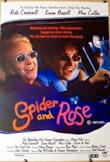AustLit
Latest Issues
AbstractHistoryArchive Description
'Young Spider McCall is an ambulance driver with 'attitude'. Recently resigned, his final assignment is to drive an elderly patient from a hospital in Sydney to her son's farm in the country. It's a long journey and Spider isn't about to miss his own farewell party. Sure enough, when the nurse wheels the old lady towards Spider's ambulance, his fears are confirmed. This could be one long trip!'
Source: Screen Australia.
Publication Details of Only Known VersionEarliest 2 Known Versions of
Works about this Work
-
'Jesus! A Geriatric - That's All I Need!' : Learning to Come of Age With/in Popular Australian Film
2011
single work
criticism
— Appears in: Global Studies of Childhood , vol. 1 no. 4 2011; (p. 332-342)'Popular film texts are powerful means by which Western societies construct, maintain, protect and challenge concepts of childhood and youth-hood. As a context where audiences learn about the self, their culture, and their place within it, popular film is understood here as pedagogic, that is, as a space where key lessons about the formation of subjecthood might take place, and at what costs. This article takes into account scholarship on popular culture as pedagogy, challenging narrow notions of popular film as a simple transmission of knowledge. Focused on how pedagogies might be at work, this article explores the use of humour, repetition, otherness, becoming and sentimentality within a selection of Australian films, and how they orientate audiences towards knowing the youth subject in particular ways. Questions of generation and how it is constructed as a commonsense battle between ‘young’ and ‘old’ are considered through the coming-of-age films, The Rage in Placid Lake (2003), Hey Hey It’s Esther Blueburger (2008), Crackers (1998) and Spider & Rose (1994).'
Source: Author's abstract.
-
'Jesus! A Geriatric - That's All I Need!' : Learning to Come of Age With/in Popular Australian Film
2011
single work
criticism
— Appears in: Global Studies of Childhood , vol. 1 no. 4 2011; (p. 332-342)'Popular film texts are powerful means by which Western societies construct, maintain, protect and challenge concepts of childhood and youth-hood. As a context where audiences learn about the self, their culture, and their place within it, popular film is understood here as pedagogic, that is, as a space where key lessons about the formation of subjecthood might take place, and at what costs. This article takes into account scholarship on popular culture as pedagogy, challenging narrow notions of popular film as a simple transmission of knowledge. Focused on how pedagogies might be at work, this article explores the use of humour, repetition, otherness, becoming and sentimentality within a selection of Australian films, and how they orientate audiences towards knowing the youth subject in particular ways. Questions of generation and how it is constructed as a commonsense battle between ‘young’ and ‘old’ are considered through the coming-of-age films, The Rage in Placid Lake (2003), Hey Hey It’s Esther Blueburger (2008), Crackers (1998) and Spider & Rose (1994).'
Source: Author's abstract.




